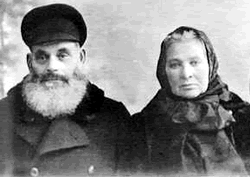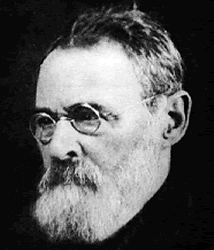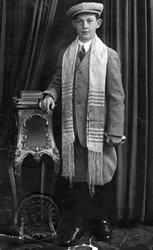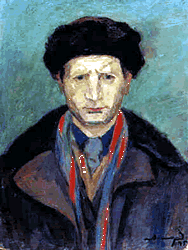Axelrod Ida was born in Dunilovitz in 1870. She followed her sister
and already at age 17 was a member of a revolutionary cell and
imprisoned. In 1893 she joined her sister in Switzerland She studied
in the university and received a pH. D. in Philosophy.
She was a member of the movement 'free the laborers' and "Eeiskara".
In 1903 She joined the Bolsheviks
and already at age 17 was a member of a revolutionary cell and
imprisoned. In 1893 she joined her sister in Switzerland She studied
in the university and received a pH. D. in Philosophy.
She was a member of the movement 'free the laborers' and "Eeiskara".
In 1903 She joined the Bolsheviks
Stacy McCain at "The Other McCain had an interesting article up which examined the family history of David Axelrod.; "David Axelrod's Red Roots; Obama Adviser's Communist Ties Exposed" AT THIS LINK here is an excerpt and the full column is a strongly recommended read.
"Presidential historian Paul Kengor has dug up some fascinating facts about the background of David Axelrod, showing President Obama’s top political strategist to have deep ties to the American Communist Party (CPUSA) and other leftist individuals and organizations.
For example, Axelrod’s mother, Myril Bennett Axelrod, worked for the left-wing New York newspaper, PM. Although it lasted less than a decade (1940-48), PM became notorious because of its penetration by Stalinists and others who promoted the Communist Party line on issues both foreign and domestic.
Kengor points out that PM‘s famed Washington correspondent, I.F. Stone, was subsequently identified as a Soviet agent both in the so-called “Venona” documents and also by a former top KGB official, Oleg Kalugin.
Kengor points out that PM‘s famed Washington correspondent, I.F. Stone, was subsequently identified as a Soviet agent both in the so-called “Venona” documents and also by a former top KGB official, Oleg Kalugin.
It is unclear where Axelrod’s mother fit in the orbit of Communists, Soviet sympathizers and other “progressives” who worked at PM, Kengor says, because despite “scouring reel upon reel of microfiche” copies of the newspaper, he was “unable to find a single article with Myril’s byline.” Nevertheless, her association with the paper locates her politics on the far-left fringe of the American politic spectrum in the 1940s, which would seem important to understanding her son’s later activities.
While a student at the University of Chicago in the early 1970s, David Axelrod began working as a political reporter for the Hyde Park Herald, which Kengor says brought Axelrod to the attention of Don Rose and David Canter. Both of these men were associated with the Communist Party and other far-left organizations."
The name Axelrod has a significant history as far as radical, revolutionary activities are concerned. There is no indication that David Axelrod is connected by family to these other Axelrod's but the McCain article shows that there there appears to be a strong philosophical connection between the major Russian revolutionary socialist/communist figures and what McCain calls David Axelrod's "Red Roots" from his side of the family.
To have this possible family connection further pursued by a competent researcher/genealogists might be helpful to see how deep the connection may go. Certainly if the connection is developed it would go a long way to explaining the motivation behind the forces behind the community organizer who became president with their help.
To put this revolutionary history in context I asked the outstanding writer Bert Korn,who so eloquently defended Sarah Palin at the time of the Gifford's shooting, and Palin's "blood libel" response to the disgusting media attacks on her, for his overview of why the Axelrod family acted as they did: he replied as follows; (Mr. Korn writes at Jews for Sarah
AT THIS LINK)
"Though entirely legitimate to talks about Axelrod’s family’s politics, one could argue that he’s given up revolutionary cause for democratic socialism of the European variety. Still abhorent to us, but “legitimate” from pov of modern democracies.
Also, Russian Jews were completely disenfranchised from, and persecuted by, all traditional institutions: the monarchy, the church, the army, the universities, the high culture – not to mention a peasantry who hated them and a landed gentry who might or might not find them useful or tolerable. If Jews strayed from a purely religious awareness into politics, where were they (we) to go? That is why the political ones were almost all leftists, although they believed in the humanity of Man. The varieties of Jewish leftism, from communist to anarchist, to unionist, to labor Zionist, etc. demonstrated a people struggling mightily to come to terms with their utter powerlessness and seemingly endless persecution.
To put this revolutionary history in context I asked the outstanding writer Bert Korn,who so eloquently defended Sarah Palin at the time of the Gifford's shooting, and Palin's "blood libel" response to the disgusting media attacks on her, for his overview of why the Axelrod family acted as they did: he replied as follows; (Mr. Korn writes at Jews for Sarah
AT THIS LINK)
"Though entirely legitimate to talks about Axelrod’s family’s politics, one could argue that he’s given up revolutionary cause for democratic socialism of the European variety. Still abhorent to us, but “legitimate” from pov of modern democracies.
Also, Russian Jews were completely disenfranchised from, and persecuted by, all traditional institutions: the monarchy, the church, the army, the universities, the high culture – not to mention a peasantry who hated them and a landed gentry who might or might not find them useful or tolerable. If Jews strayed from a purely religious awareness into politics, where were they (we) to go? That is why the political ones were almost all leftists, although they believed in the humanity of Man. The varieties of Jewish leftism, from communist to anarchist, to unionist, to labor Zionist, etc. demonstrated a people struggling mightily to come to terms with their utter powerlessness and seemingly endless persecution.
Axelrod Family | |
Click on Photos to Enlarge | |
#axl-1:Moyshe and Khave Axelrod Nov. 21, 1926 City Vilna | #axl-2: Pavel Axelrod ( 1850- 1928) read story #axl-3 |
#axl-3: Julius Axelrod on his Bar Mitzvah 1925, New York City. read story of Dr. Axelrod below. The Axelrod family of Dunilovitz Rabbi Yitzhak was born c 1845. He was the rabbi of Dunilovitz c 1870. In the book "Yahadut Lita" volume 3 page 112-113 there is a story about his two revolutionary daughters. Axelrod Lyuba was born in 1868 in Dunilovitz . Already at age 15 she left her family in Dunilovitz to Vilna. There she joined under ground organizations and moved to Poltachova, Kharkov and Malitopol in the Ukraine. After the assassination of the Russian czar Alexander in 1889, she moved with her friend; Ch. Rapoport, first to Paris and then to Switzerland. Studied in the university of Bern were she received a Ph.D. (Philosophy. ) She was politically involved with the underground S.D and later S.R. After the revolt of 1905 she returned to Russia and wrote for some socialist newspapers. She was a member of the professional union in St. Petersburg. She lectured in centers for unionized laborers. In 1915 she was punished and sent to Siberia together with all the members of the Russian paper " our concern'. In 1917 she was an editing member of the Russian papers "Unity". After the first revelation in 1917 she was a member of the central S.D and the temporary parliament After the Bolshevik revolution of October (1917), she retired from political activities. She lived in Tambov 1918- 1920 and in 1921 headed a philosophy department in the institution of "Red professorship". Her bibliography (all in Russian); "Philosophical dissertation" 1906 "In opposition to Idealism" 1922 "Criticism of the capitalist society and historical materialism" 1925 L. Tolstoy and the S. D." Axelrod Ida was born in Dunilovitz in 1870. She followed her sister and already at age 17 was a member of a revolutionary cell and imprisoned. In 1893 she joined her sister in Switzerland She studied in the university and received a pH. D. in Philosophy. She was a member of the movement 'free the laborers' and "Eeiskara". In 1903 She joined the Bolsheviks. After some time she transferred together with Georgi Plekhanov 1856 – 1918 the Mensheviks. During the First World War she was a member of the group that signed the pamphlet "'To the nation of workers in Russia" (1915). Took part in the collection by Plekhanov "War". http://www.nlr.ru:8101/eng/nlr/housePleh/p1.htm Returned to Russia before the October, 1917 overthrow. Wrote revues of Marxist literatures. (I do not know if Axelrod was the original name of the sisters; on the Internet I found information about another Axelrod who might be somehow related) http://www.spartacus.schoolnet.co.uk/RUSaxelrod.htm Pavel Axelrod was born in Chernigov, Russia, in 1850. Deeply influenced by the writings of Mikhail Bakunin, he established a socialist group of students in Kiev. He also contributed to the radical journals, Worker and Commune. In 1877 he joined the Land and Liberty. Three years later the group split into two factions. The majority of members, who favoured a policy of terrorism, established the People's Will. Axelrod and George Plekhanov established the Black Repartition group that rejected terrorism and supported a socialist propaganda campaign among workers and peasants. Axelrod went with George Plekhanov to live in Switzerland and in 1883 they established the Liberation of Labour group. In March, 1898, the various Marxist groups in Russia met in Minsk and decided to form the Social Democratic Labour Party (SDLP). The party was banned in Russia so most of its leaders were forced to live in exile. Axelrod became co-editor of a journal called Iskra. It was printed in several European cities and then smuggled into Russia by a network of SDLP agents. At the Second Congress of the Social Democratic Labour Party in London in 1903, there was a dispute between Vladimir Lenin and Julius Martov, two of SDLP's leaders. Lenin argued for a small party of professional revolutionaries with a large fringe of non-party sympathizers and supporters. Martov disagreed believing it was better to have a large party of activists. Julius Martov based his ideas on the socialist parties that existed in other European countries such as the British Labour Party. Lenin argued that the situation was different in Russia as it was illegal to form socialist political parties under the Tsar's autocratic government. At the end of the debate Martov won the vote 28-23 . Vladimir Lenin was unwilling to accept the result and formed a faction known as the Bolsheviks. Those who remained loyal to Martov became known as Mensheviks. Along with Julius Martov, Pavel Axelrod, Leon Trotsky, Irakli Tsereteli, Moisei Uritsky, Noi Zhordania and Fedor Dan, Axelrod joined the Mensheviks. However, a large number of important figures in the Social Democratic Labour Party, including Gregory Zinoviev, Anatoli Lunacharsky, Joseph Stalin, Mikhail Lashevich, Nadezhda Krupskaya, Mikhail Frunze, Alexei Rykov, Yakov Sverdlov, Lev Kamenev, Maxim Litvinov, Vladimir Antonov, Felix Dzerzhinsky, Gregory Ordzhonikidze and Alexander Bogdanov joined the Bolsheviks. An opponent of the First World War, Axelrod worked with Julius Martov, Vladimir Antonov and Leon Trotsky, to produce the internationalist newspaper, Our World. After the February Revolution Axelrod returned to Russia but was too late to stop some Mensheviks joining the Provisional Government. He strongly criticized those Mensheviks such as Irakli Tsereteli and Fedor Dan who now supported the war effort. However at a conference held on 18th June, 1917, he failed to gain the support of the delegates for a policy of immediate peace negotiations with the Central Powers. After the October Revolution, which Axelrod called a "historical crime without parallel in modern history", he toured the world rallying socialist opposition to the Bolsheviks. Pavel Axelrod died in 1928. Pavel Axelrod ( son of Boris) http://www.spartacus.schoolnet.co.uk/RUSaxelrod.htm Pavel Axelrod was born in Chernigov, Russia, in 1850. Deeply influenced by the writings of Mikhail Bakunin, he established a socialist group of students in Kiev. He also contributed to the radical journals, Worker and Commune. In 1877 he joined the Land and Liberty. Three years later the group split into two factions. The majority of members, who favoured a policy of terrorism, established the People's Will. Axelrod and George Plekhanov established the Black Repartition group that rejected terrorism and supported a socialist propaganda campaign among workers and peasants. Axelrod went with George Plekhanov to live in Switzerland and in 1883 they established the Liberation of Labour group. In March, 1898, the various Marxist groups in Russia met in Minsk and decided to form the Social Democratic Labour Party (SDLP). The party was banned in Russia so most of its leaders were forced to live in exile. Axelrod became co-editor of a journal called Iskra. It was printed in several European cities and then smuggled into Russia by a network of SDLP agents. At the Second Congress of the Social Democratic Labour Party in London in 1903, there was a dispute between Vladimir Lenin and Julius Martov, two of SDLP's leaders. Lenin argued for a small party of professional revolutionaries with a large fringe of non-party sympathizers and supporters. Martov disagreed believing it was better to have a large party of activists. Julius Martov based his ideas on the socialist parties that existed in other European countries such as the British Labour Party. Lenin argued that the situation was different in Russia as it was illegal to form socialist political parties under the Tsar's autocratic government. At the end of the debate Martov won the vote 28-23 . Vladimir Lenin was unwilling to accept the result and formed a faction known as the Bolsheviks. Those who remained loyal to Martov became known as Mensheviks. Along with Julius Martov, Pavel Axelrod, Leon Trotsky, Irakli Tsereteli, Moisei Uritsky, Noi Zhordania and Fedor Dan, Axelrod joined the Mensheviks. However, a large number of important figures in the Social Democratic Labour Party, including Gregory Zinoviev, Anatoli Lunacharsky, Joseph Stalin, Mikhail Lashevich, Nadezhda Krupskaya, Mikhail Frunze, Alexei Rykov, Yakov Sverdlov, Lev Kamenev, Maxim Litvinov, Vladimir Antonov, Felix Dzerzhinsky, Gregory Ordzhonikidze and Alexander Bogdanov joined the Bolsheviks. An opponent of the First World War, Axelrod worked with Julius Martov, Vladimir Antonov and Leon Trotsky, to produce the internationalist newspaper, Our World. After the February Revolution Axelrod returned to Russia but was too late to stop some Mensheviks joining the Provisional Government. He strongly criticized those Mensheviks such as Irakli Tsereteli and Fedor Dan who now supported the war effort. However at a conference held on 18th June, 1917, he failed to gain the support of the delegates for a policy of immediate peace negotiations with the Central Powers. After the October Revolution, which Axelrod called a "historical crime without parallel in modern history", he toured the world rallying socialist opposition to the Bolsheviks. Pavel Axelrod died in 1928. Lyubov Axelrod For another leading Menshevik with the same last name, see Pavel Axelrod. Lyubov Isaakovna Axelrod (born Emther Axelrod, Russian: , 1868 - 1946) was a Russian revolutionary, Marxist philosopher and an art theoretician. Axelrod was born in the family of a rabbi in Vilenkovichi, a village in the Vilna gubernia of the Russian Empire. She became involved with the narodnik organization at age 16 and took part in unsuccessful attempts to assassinate Alexander III of Russia. In 1887 she emigrated to Switzerland and received her Ph.D. in philosophy from Berne University in 1900. In 1892 she became a Marxist and joined the Geneva-based Emancipation of Labor group, becoming a close associate of its leader Georgi Plekhanov. When the Russian Social Democratic Labor Party split into Bolsheviks and Mensheviks at its Second Congress in 1903, she sided with the Menshevik faction. In 1906 Axelrod returned to Russia and became a leading Russian authority on Marxist philosophy, second only to Plekhanov. She was critical of both Alexander Bogdanov and Vladimir Lenin during their debate over Empiriocriticism in 1908-1909, branding their ideas anti-Marxist. In the 1920s she first worked at the Institute of Red Professors and later at the Soviet Institute of Philosophy. In the 1930s her version of Marxism was officially denounced as a Mechanistic revision of Marxism and she faded into obscurity. **************************** Lyubov Isaakovna Axelrod (born Emther Axelrod, Russian: Любо́вь (Эмтер) Исаа́ковна Аксельро́д, penname Orthodox Russian:Ортодо́кс, 1868 - 1946) was a Russian revolutionary, Marxist philosopher and an art theoretician. Axelrod was born in the family of a rabbi in Vilenkovichi, a village in the Vilna gubernia of the Russian Empire. She became involved with thenarodnik organization at age 16 and took part in unsuccessful attempts to assassinate Alexander III of Russia. In 1887 she emigrated toSwitzerland and received her Ph.D. in philosophy from Bern University in 1900. In 1892 she became a Marxist and joined the Geneva-based Emancipation of Labor group, becoming a close associate of its leader Georgi Plekhanov. When the Russian Social Democratic Labor Party split into Bolsheviks and Mensheviks at its Second Congress in 1903, she sided with the Menshevik faction. In 1906 Axelrod returned to Russia and became a leading Russian authority on Marxist philosophy, second only to Plekhanov. She was critical of both Alexander Bogdanov and Vladimir Lenin during their debate over Empiriocriticism in 1908-1909, branding their ideas anti-Marxist. ********************************************************** Pavel Borisovich Axelrod (Russian: Па́вел Бори́сович Аксельро́д August 25, 1850 – April 16, 1928) was a Russian Menshevik. [edit]Early life and careerBorn Pinches Borutsch (Russian: Пи́нхус Бо́рух) in Potscheff near Chernigov and raised toShklov, a small provincial town in (currently Belarus) and Mogilev, the biggest town of the three in the Russian Empire (currently Belarus), Axelrod was the son of a Jewish innkeeper. In 1875 in Geneva, Axelrod married his former private student Nadezhda Ivanovna Kaminer. A student himself, Axelrod was Kaminer's and her sister 's tutor. Despite severe financial hardship during the first years, the marriage proved to be successful. They had three children: Vera(22.11.1875), Alexander (18.07.1879) and Sofia (14.11.1881). Nadezhda Ivanovna Axelrod-Kaminer died in 1906. In the mid-1880s Axelrod established his own small company producing kefir. By the end of the 1890s, Axelrod's company had offices in Zurich, Geneva, and Basel, which provided steady income and allowed him to support revolutionaries. In 1908, Axelrod sold his company in exchange for the retirement payments to him from the new owner. [edit]Marxist revolutionaryInfluenced by Mikhail Bakunin in his youth, he remained an Idealist even after adopting theMarxist philosophy of historical materialism. Axelrod co-founded the Marxist groupEmancipation of Labor in Switzerland with his lifelong friend Georgi Plekhanov and Vera Zasulich in 1883. In 1900, Axelrod, Plekhanov and Zasulich joined forces with younger revolutionary Marxists Julius Martov, Vladimir Lenin and Alexander Potresov and the six edited Iskra, a Marxist newspaper, from 1900 to 1903. When Iskra supporters split at theSecond Congress of the Russian Social Democratic Labor Party in 1903, Axelrod sided with the Menshevik faction against Vladimir Lenin's Bolsheviks. In 1917, after the February Revolution Axelrod returned to Russia. By then some Mensheviks had already joined Kerensky's Provisional Government and supported government war policy. Despite all his efforts Axelrod failed to gain Mensheviks' support for a policy of immediate peace negotiations with the Central Powers. After the Bolshevik victory, which Axelrod called a "historical crime without parallel in modern history", he toured the world rallying socialist opposition to the Bolsheviks. | |




